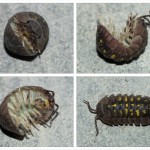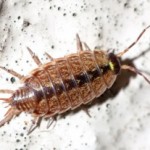KEYS
- A key is used to identify an organism.
- A key consists of pairs (or small groups) of statements
- In each pair or group of statements only one of those statements will be true
Think of each group of statements as a clue
When using a key follow these rules:
- Always start at clue number 1. This will have 2 or more statements in it.
- Look for the correct statement . This may give you the name of the organism.
If it doesn’t you must go to the clue it directs you to. - Repeat rule 2 until you have the name of the organism you are trying to identify.
Example 1
 Use the key below to find the group that the animal above belongs to
Use the key below to find the group that the animal above belongs to
| 1. Has an internal skeleton (vertebrate)) ………………………………. Goto 5 Has no internal skeleton (invertebrate) ……………………………… Goto 2 2. Has an exoskeleton (a hard outside skin) ……………………………… Goto 3 3. six legs ………………………………………………………Goto 8 4. Body divided into segments…………………………………………Goto 7 5. Has fur or hair. Is warm blooded……………………………………Mammal 6. Has one pair of legs on each segment………………………………..Centipede 7. Pinkish brown. Slender body. Body has small bristles on each segment……Earthworm 8. Body divided into 3 parts, often has 2 pairs of wings…………………Insect |
How to answer the question:
We can tell by looking at it that this is a snail and hence a mollusc, but how do we use the key?
Start at rule 1.
This animal has no internal skeleton so we go to clue 2
It has a soft skin so we go to clue 4
It has no segments which tells us that it is a mollusc
Example 2
The key shown below shows three woodlice.
The key is used to identify them.
(Woodlouse 3 has already been done for you)
Pick one of the three woodlice and use the key to find out its name
Remember.. start at clue 1
Woodlouse 1

Description
When threatened this woodlouse rolls up into a tight ball (with no gap).
It has a dull in appearance.
It can be up to 1.5cm (15mm) long.
This woodlouse cannot roll into a ball and is shiny.
It is around 1cm (10mm) long but can be slightly bigger
Woodlouse 3
Common striped Woodlouse

Clue 1
Can roll into a ball ……………. Go to 2
Cannot roll into a ball ……….. Go to 3
Clue 2.
Rolls up completely leaving no gap….. Common Pill Woodlouse
When it rolls up there is a gap ……… Armadillium Nasatum
Clue 3
.Does it have a clear dark stripe down its back?
Yes …………………. Common Striped Woodlouse
No …………………. Go to 4
4. Is it shiny?
Yes ……………… go to 5
No Common Rough woodlouse
5. Is it longer than 5mm?
Yes …………… Common Shiny Woodlouse
No …………… Common Pygmy Woodlouse
Woodlouse 1 = Answer shown here
Woodlouse 2 = Answer shown here


